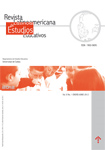Authors
Abstract
Education is a core idea and a principle in pedagogy, it is a humanization processthat consolidates individual and social evolution/development with its realization and potentiation as a rational, autonomous and caring being. It means to understand the immediate and natural meaning in order to go to self-configuration processes, proper of a-temporal with cultural identities beings. Niklas Luhmann´s “System Theory” is one of the excuses that inspire to venture forth into the labyrinths of the curriculum and education bespoken world in order to justify how education is a critical point in the programs to educate educators. Emergencies to invigorate the “illusion of education” are found from the different proposals, among which appear the remodeling of the life world, the autopoyesis, the language non-neutrality, the linguistic twist and the irony, among other adventures. How education requires the assumption of symbolic figures, not as arbitrary creations but as necessary reference points, is proposed, because words and concepts are also icons, images and metaphors that give meaning and value to the curricular actions. These are the reflections, from perspectives different from those of education and curriculum, that will “resist and flow” among other discourses that remain petrified in time, captured in the orthodoxy of replication and instruction.
References
Bernstein, B. (1985). Clasificación y enmarcación del conocimiento educativo. Madrid: Akal editores.
Bowles, S yGintis, H. (1981). La instrucción escolar en la américa capitalista. Madrid: Siglo XXI
Calvo, C. (2006). Del mapa escolar al territorio educativo: diseñando la escuela a partir de la educación. Barcelona: Anthropos (en prensa).
Da Silva, T. T. (1995). Escuela Conocimiento y Currículo. Buenos Aires: Ensayos críticos. Díaz, Ángel Sebastián. (2.006). “Mapas, poder y conocimiento: J. Brian Harley o el giro post estructuralista de la Historia de la Cartografía”. Recuperado de http://historia en mapas.blogspot.com/2006/12/mapas-poder-y conocimiento-j.html
Ferry, Gilles. (1.991). El Trayecto de la Formación: los enseñantes entre la teoría y la práctica. Universidad Autónoma de México, Escuela Nacional de Estudios Profesionales Iztacala. Barcelona: Ediciones Paidós. ISBN: 84- 7509-664-6.
González Moena Sergio. (1997) El Pensamiento Complejo. En torno a Edgar Morín. América Latina y los Procesos Educativos. Santafé de Bogotá. Cooperativa Editorial del Magisterio.
Habermas, Jurgen. (1988). Accesos a la Problemática de la Racionalidad. Teoría de la Acción Comunicativa I. Racionalidad de la Acción y Racionalización Social. Editorial Taurus. Madrid
______________. (1996). Ciencia y técnica como Ideología. (1era reimpresión). México.
Hamilton, David. (1991-1993) Orígenes de los términos educativos “clase” y “currículum”. En: Revista de Educación: Historia del currículo (I), No. 295 y En: Revista Iberoamericana de Educación, No. 1.
Harley, J. Brian J. (1.988) Mapas, poder y conocimiento: o el giro post estructuralista de la Historia de la Cartografía. México: Fondo de cultura económica.
Gimeno Sacristán, J. y Pérez Gómez, A. (1983) La enseñanza. Su teoría y su práctica. Madrid: Akal
Giroux, Henry A. (1997). Los Profesores como Intelectuales. Hacia una Pedagogía Crítica del Aprendizaje. Paidós. 1era Reimpresión. Barcelona: Paidós: ISBN: 84– 7509-588-7.
Luhmann, N. (1998). Teoría de la Sociedad y Pedagogía. Buenos Aires: Paidós.
Mélich, J.C (1998). Antropología Simbólica y Acción Educativa. lª Reimpresión. Barcelona: Paidós.
Maturana, H. (2002). El sentido de lo Humano. (Undécima Edición). Santiago de Chile: Dolmen Ediciones.
Miñana, C. (2006). De la misión de la UN: Un esfuerzo por entender el punto de vista de los reformadores. Bogotá: Universidad Nacional de Colombia.
Ricoeur P. (2.008). El conflicto de las interpretaciones. Segunda reimpresión 2.008. Buenos Aires. Fondo de Cultura Económica.
Rorty, Richard, (1.991). Contingencia, ironía y solidaridad. Barcelona: Paidós
Serna, Arango, Julián. (2.002) Palabras y Sentido, Revista de Ciencias Humanas, Nº 28 Última modificación, enero de 2002.
Shane, Harold G. (1980). Significant writings that have influenced the curriculum: 1906-1981. Phi Delta Kappa. No. 5. Vol. 62, pp.311-314.
Tiramonti, G. (1998). “Regulación social y reforma educativa”. En FLACSO. La formación docente. Buenos Aires: Troquel.
Von Hayek, F. (1998). Los fundamentos de la libertad. Sexta edición. Madrid: Unión Editorial, S.A.
Zalamea Gustavo. (1981). ¡Qué viva el dibujo! . El Templo No 2. Bogotá.

 PDF (Español)
PDF (Español)
 FLIP
FLIP



















